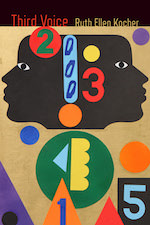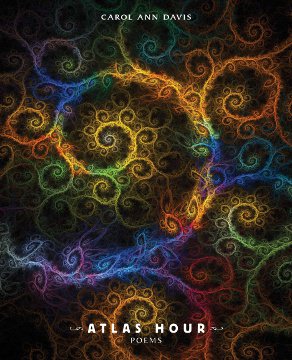Third Voice
by Ruth Ellen Kocher
$19.95
Third Voice asserts lyric beyond personal expression and drama beyond the stage, using the spectacle of minstrelsy as a deformation of mastery in an audaciously conceptual yet visceral performance.
Format: paperback
Out of stock
“Kocher (Ending in Planes) takes a cue from T.S. Eliot’s essay “The Three Voices of Poetry” as she utilizes the third voice—of a dramatic character—to thread history and the present. Sinking into the uncomfortable truths of her characters, Kocher uses these voices—including those of Richard Pryor, Paul Robeson, Pearl Bailey, and Eartha Kitt—as a means of challenging racism and exposing its changing reflection, whether it manifests as a grotesque caricature or a psychic wounding. Kocher mixes instructions on the running of a minstrel show with short skits featuring fictional women with names such as Lacy N. Igga and historical figures such as Malcolm X. In “[No Saints] One Act,” the poetic “I” is replaced with the poetic “You,” with the self becoming another character: “If you spoke to the voice in your head you could finally understand but would discover a different language.” There’s a lot to process in this collection, but the language is rich, deep, lyrical, and engaging enough to support the reader through the complexity of the presentation. The dramatic voices that operate throughout act as a reminder that history is a fragmented reality with many angles, not simply a linear series of indisputable facts.” —Publishers Weekly
“Taking T. S. Eliot’s idea of the ‘third’ or dramatic persona speaking to another invented persona, Ruth Ellen Kocher conjures a cast of nine speakers who ‘perform’ a series of prose poems. The nineteenth-century minstrel show provides the venue for these characters, whose language and subject matter contrast with ‘sampled’ language Kocher appropriates from philosophy texts and minstrel manuals. Passages from these manuals (‘How to Stage a Minstrel Show,’ and ‘New Jokes for Female Minstrels’) reveal the racist stereotyping that undergirds early American vaudeville and burlesque—and, by inference, all liberal and performing arts. Into this history, through prose poems, Kocher brings African American civil rights martyrs (Martin Luther King Jr., Emmett Till, Malcolm X), performing artists (Pearl Bailey, Eartha Kitt, Richard Pryor, Sun Ra), and cultural icons (W.E.B. Du Bois, Marcus Garvey, and Paul Robeson).” — Robin Becker, “(In)justice of the Place: Design and Pattern in Contemporary Political Poetry,” The Georgia Review
Finalist, 2017 Binghamton University Milt Kessler Poetry Book Award
Finalist, 2017 UNT Rilke Prize
Praising the power of lyric drama, T. S. Eliot described the use of third voice as a means for characters to address and interrogate one another, and second voice as a way for characters to talk to the audience. In this daring new book, the principal narrator presents as a caricature reflecting the tangible experiences of a disembodied “I” posed against absurd selfhood—a voice imbued by sublime otherness. Within a dismantled minstrel show, Ruth Ellen Kocher frames a female voice splintered and re-figured as “self” and “character.” The incomprehensible nature of the sublime emerges through a cast of other personages including Eartha Kitt, Geordi LaForge, Immanuel Kant, W. E. B. Du Bois, and Malcolm X. Third Voice asserts lyric beyond personal expression and drama beyond the stage, using the spectacle of minstrelsy as a deformation of mastery in an audaciously conceptual yet visceral performance.
Praise for her previous book:
“domina Un/blued is at once deeply moving and wildly intelligent… a wonderful book—sophisticated, beautiful, and innovative”
— Lynn Emanuel
“Kocher layers culture on culture—the American quotidian on top of modern-day Italian on top of the remnants of Roman civilization—a palimpsestic technique that highlights how supposedly extinct contours and patterns bleed through to the present day. The primary subject of this collection is a monstrous one—slavery—and Kocher approaches it backwards, holding a mirror. This oblique approach allows us to triangulate our way to truths that remain unavailable to the standard histories, the way the heritage of slavery continues to shape our society. Kocher’s formal innovations reflect unexpected angles on her subject, and surprise us everywhere…”
—from the PEN Open Book Award Judges’ Citation
Additional information
| Weight | .4 lbs |
|---|---|
| Dimensions | 6 × .5 × 9 in |
SKIT: Pearl Bailey and Eartha Kit Revise Observations on the Feeling of the Beautiful
Whether we love it or hate it is irrelevant to its worth. We have heard
more women call women whores than we have heard men call women
whores. We have more light than we know what to do with. Live with it.
Some time ago, a Woman asked us for five women we loved and five
women we hated and five women we hated to love … or maybe five
women we hated and five women we loved and five women we loved to
hate … or both. We haven’t been able to answer. We’re trying not to
sing too easy green and violet veins meaning moth-winged flower
or would it be worse to say bloom? The shackled hardwood, the ribs of the
house, the ribs of a huge beast, the ribs of a fossil, the ribs of a thing des-
tined to be stone. We call ourselves Away. Stranded is a place not a
thing.






